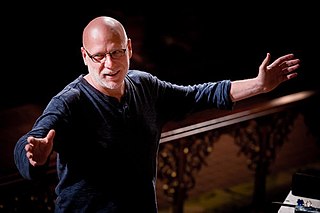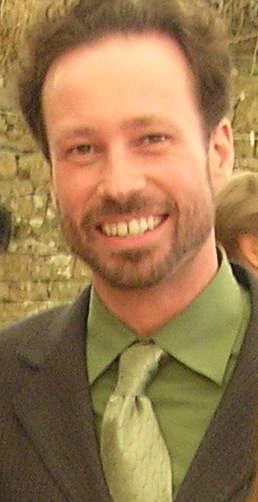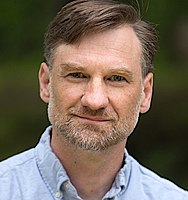
Giovanni Pierluigi da Palestrina was an Italian composer of late Renaissance music. The central representative of the Roman School, with Orlande de Lassus and Tomás Luis de Victoria, Palestrina is considered the leading composer of late 16th-century Europe.

The Mass is a form of sacred musical composition that sets the invariable portions of the Christian Eucharistic liturgy, known as the Mass.

Johannes Ockeghem was a Franco-Flemish composer and singer of early Renaissance music. Ockeghem was the most influential European composer in the period between Guillaume Du Fay and Josquin des Prez, and he was—with his colleague Antoine Busnois—the leading European composer in the second half of the 15th century. He was an important proponent of the early Franco-Flemish School.
Jacques Arcadelt was a Franco-Flemish composer of the Renaissance, active in both Italy and France, and principally known as a composer of secular vocal music. Although he also wrote sacred vocal music, he was one of the most famous of the early composers of madrigals; his first book of madrigals, published within a decade of the appearance of the earliest examples of the form, was the most widely printed collection of madrigals of the entire era. In addition to his work as a madrigalist, and distinguishing him from the other prominent early composers of madrigals – Philippe Verdelot and Costanzo Festa – he was equally prolific and adept at composing chansons, particularly late in his career when he lived in Paris.
The Gramophone Classical Music Awards, launched in 1977, are one of the most significant honours bestowed on recordings in the classical record industry. They are often viewed as equivalent to or surpassing the American Grammy award, and referred to as the Oscars for classical music. They are widely regarded as the most influential and prestigious classical music awards in the world. According to Matthew Owen, national sales manager for Harmonia Mundi USA, "ultimately it is the classical award, especially worldwide."
Nicolas Gombert was a Franco-Flemish composer of the Renaissance. He was one of the most famous and influential composers between Josquin des Prez and Palestrina, and best represents the fully developed, complex polyphonic style of this period in music history.

Cristóbal de Morales was a Spanish composer of the Renaissance. He is generally considered to be the most influential Spanish composer before Tomás Luis de Victoria.

Pierre de la Rue was a Franco-Flemish composer and singer of the Renaissance. His name also appears as Piersson or variants of Pierchon and his toponymic, when present, as various forms of de Platea, de Robore, or de Vico. A member of the same generation as Josquin des Prez, and a long associate of the Habsburg-Burgundian musical chapel, he ranks with Agricola, Brumel, Compère, Isaac, Obrecht, and Weerbeke as one of the most famous and influential composers in the Netherlands polyphonic style in the decades around 1500.

Raffaele Marcellino is an Australian composer.

The Tallis Scholars is a British professional early music vocal ensemble normally consisting of two singers per part, with a core group of ten singers. They specialise in performing a cappella sacred vocal music.

Colin Mawby KSG was an English organist, choral conductor and composer. From 1961 he was Master of Music at Westminster Cathedral, then from 1981 he was the choral director at Radio Telefís Éireann. He composed masses dedicated to specific choirs, including in Germany. He was awarded Knighthood of the Order of St. Gregory in 2006.

Donald Nally is an American conductor, chorus master, and professor of conducting, specializing in chamber choirs, opera, and new music. He is conductor of the professional new-music choir, The Crossing, based in Philadelphia. He teaches graduate students at Northwestern University's Bienen School of Music.
In the years centering on 1600 in Europe, several distinct shifts emerged in ways of thinking about the purposes, writing and performance of music. Partly these changes were revolutionary, deliberately instigated by a group of intellectuals in Florence known as the Florentine Camerata, and partly they were evolutionary, in that precursors of the new Baroque style can be found far back in the Renaissance, and the changes merely built on extant forms and practices. The transitions emanated from the cultural centers of Northern Italy, then spread to Rome, France, Germany, and Spain, and lastly reached England . In terms of instrumental music, shifts in four discrete areas can be observed: idiomatic writing, texture, instrument use, and orchestration.
Saint Peter's Singers (SPS) is a chamber choir associated with Leeds Minster, Leeds, West Yorkshire, England that celebrated during the Season 2017/2018 the fortieth anniversary of the choir's formation by Harry Fearnley in 1977. An anniversary concert took place at Leeds Minster on Sunday 25 June 2017 with the National Festival Orchestra and soloists Kristina James, Joanna Gamble, Paul Dutton and Quentin Brown. Further anniversary year events included Bach Cantatas and Music for Christmas at Fulneck Church in August and December respectively, Handel Coronation Anthems at Holy Trinity, Boar Lane as part of the Leeds Handel Festival in September and a tour of East Anglia in October. In November at Leeds Town Hall, the Singers participated in Herbert Howells's masterpiece Hymnus Paradisi with Leeds Philharmonic Chorus and Leeds College of Music Chorale under the direction of Dr David Hill with the Orchestra of Opera North. 2018 began with a concert of Sacred Choral Masterworks at Leeds Town Hall in February and Bach's Mass in B minor at Leeds Minster on Good Friday 2018 in memory of long-serving member Jan Holdstock. The final concert of the current season takes place at Leeds Minster on Sunday 24 June at Leeds Minster at 5.30. At this event will be presented the first performance of a new work from composer Philip Moore commissioned for the Singers' 40th anniversary – the motet Tu es Petrus – along with music by E W Naylor, Arvo Part, Sir Hubert Parry, Judith Bingham and Maurice Durufle.
New York Polyphony is a male classical vocal quartet based in New York City.

The Crossing is an American professional chamber choir, conducted by Donald Nally and based in Philadelphia, Pennsylvania. It focuses on new music, commission and premiere works, and collaborates with various venues and instrumental ensembles.
Jackson Berkey is an American composer, pianist and singer, best known for his work with Mannheim Steamroller, which he co-founded with Chip Davis in 1974.

Gregory Mertl is an American composer that has garnered commissions from the Tanglewood Music Center (1999), the Rhode Island Philharmonic (2000), the Tarab Cello Ensemble (2001), the Phoenix Symphony (2001), the Wind Ensembles of the Big Ten Universities (2002), the Ostrava Oboe Festival, Czech Republic, Kenneth Meyer and the Hanson Institute (2006), the University of Oregon (2013), CSTMA (2013), counter)induction (2016), the University of Niš (2016), and the Barlow Endowment for a piano concerto for pianist Solungga Liu and the University of Minnesota Wind Ensemble, Craig Kirchhoff, conductor, which was premiered in November, 2011 and released by Bridge Records in May 2017.
Gregory Rose is a conductor, composer, arranger, and music director. He has conducted orchestral, choral and ensemble premieres throughout Europe and the Far East.

Schola Antiqua is a professional American early music ensemble based in Chicago, Illinois. The group specializes in pre-modern vocal music and is the 2012 winner of the Noah Greenberg Award from the American Musicological Society, an award that recognizes "outstanding contributions to historical performing practices." In 2006 and 2007, Schola Antiqua served as Artist in Residence at the University of Chicago, and the group currently holds an artistic residency at the Lumen Christi Institute. Schola Antiqua of Chicago performs mainly in Chicago but has also presented concerts around the United States and internationally. The choir is under the artistic direction of Michael Alan Anderson from the Eastman School of Music.












